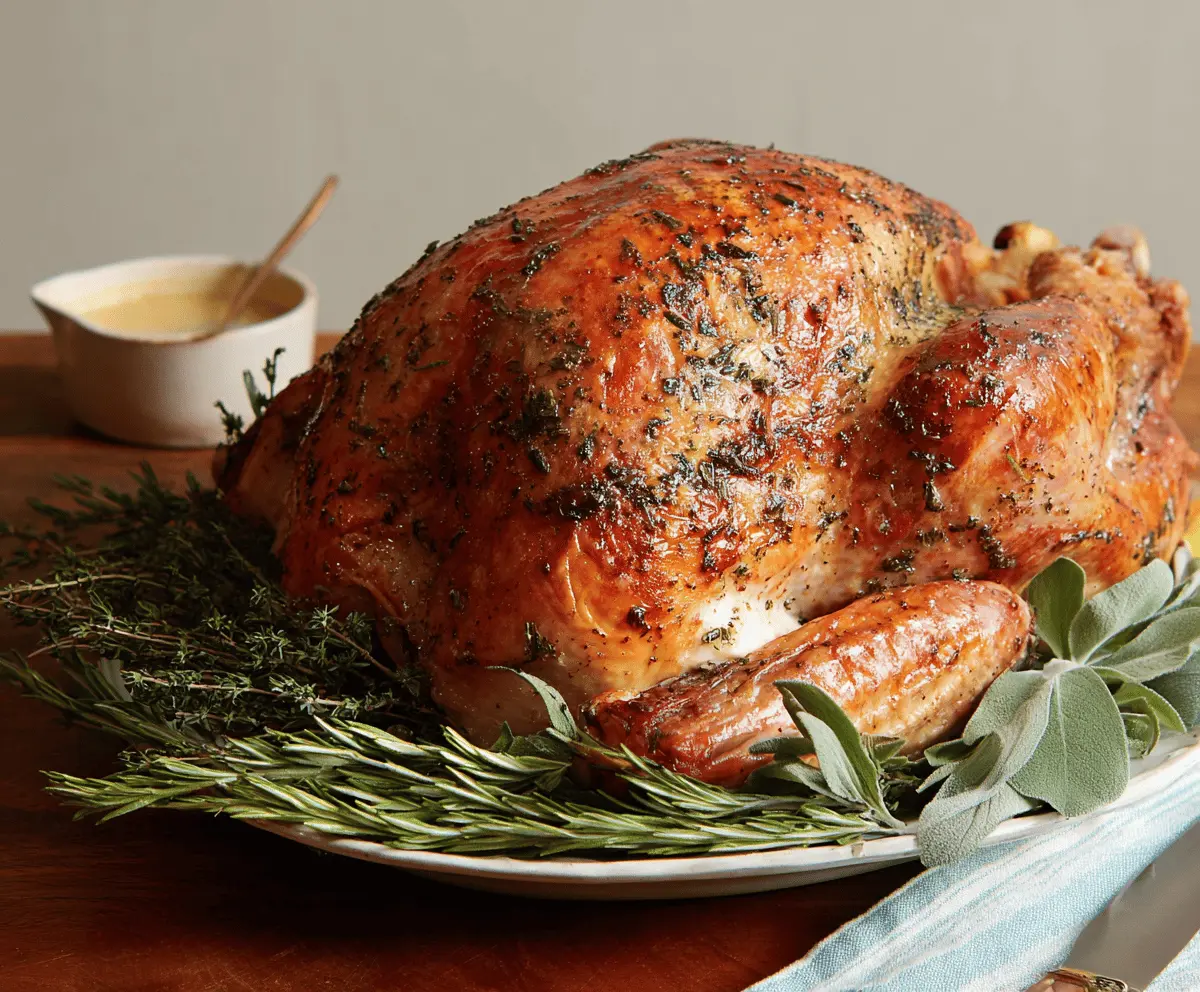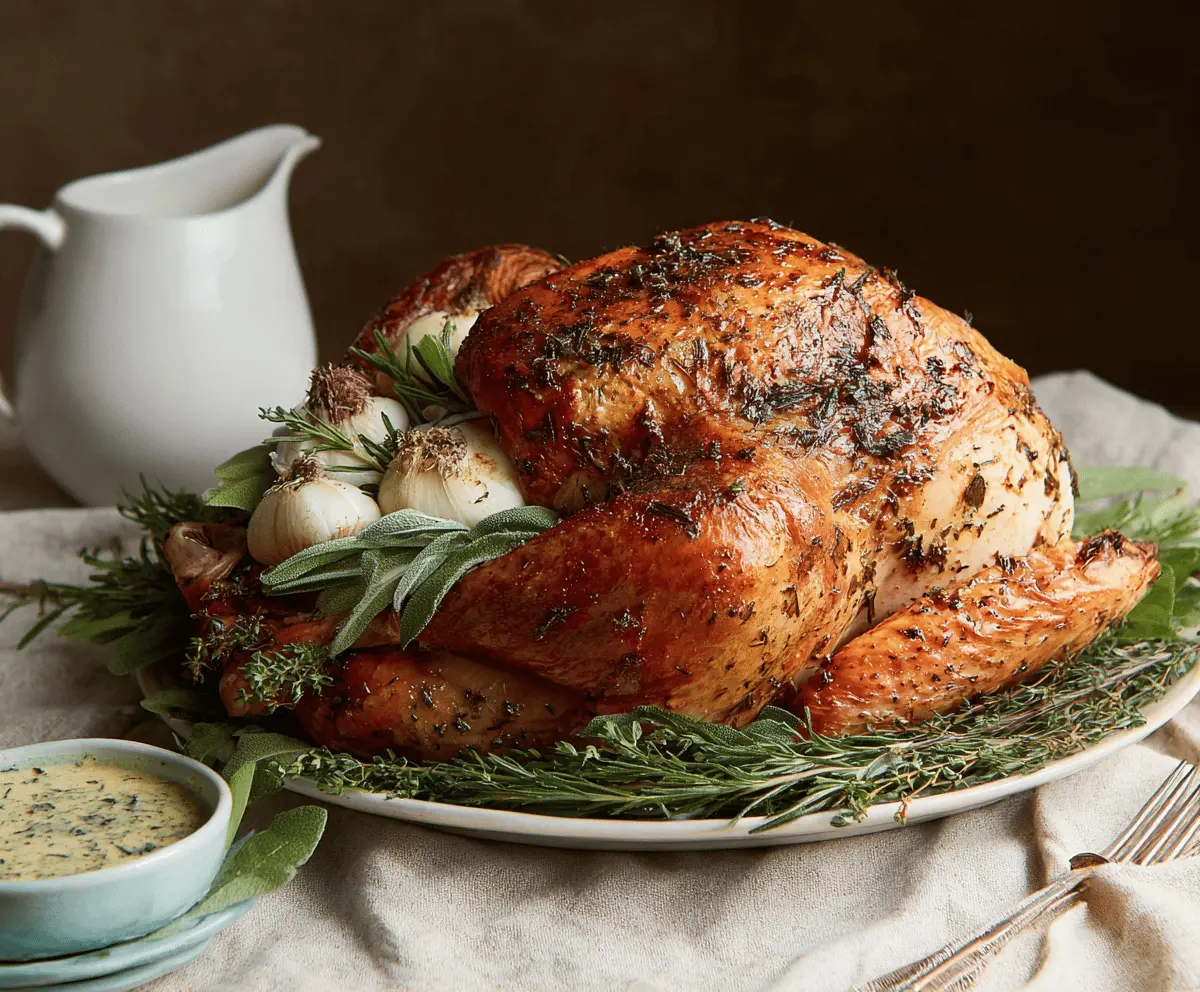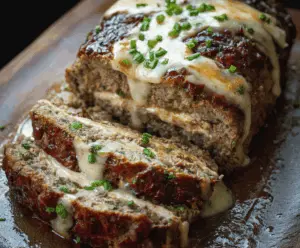This Herb Butter Roasted Turkey is juicy and full of flavor! It’s covered in savory herb butter that makes the skin crispy and golden. Perfect for family gatherings!
Trust me, the smell while it roasts will make everyone run to the kitchen! I love serving it with mashed potatoes and gravy—it’s a holiday classic you can’t resist!
Key Ingredients & Substitutions
Butter: Unsalted butter is essential for making herb butter. If you prefer to reduce dairy, use plant-based margarine or olive oil as a substitute, though the flavor will vary.
Herbs: Fresh rosemary, thyme, and sage bring a beautiful aroma. If fresh herbs aren’t available, use dried herbs—just reduce the amount by about one-third for a balanced flavor.
Turkey: A whole turkey is ideal, but if you can’t find one, a whole chicken works just fine too! Cooking times will vary, so keep an eye on it.
Broth: Chicken or turkey broth adds moisture; you can use vegetable broth for a lighter option or even water if you’re in a pinch, but the flavor will be less rich.
How Do I Ensure Crispy Skin on My Turkey?
For crispy skin, proper butter application and technique are key. Creamy herb butter applied under the skin helps keep the meat moist and adds flavor to the skin. Here’s how to get it right:
- Ensure the turkey is thoroughly dried with paper towels; moisture will prevent crispiness.
- Use softened butter—the warmer it is, the easier it’ll spread under the skin.
- Don’t rush the roasting. Low and slow cooking allows the skin to crisp without burning.
- Keep basting your turkey; the added fat aids in browning while helping it stay juicy.
- If the skin starts browning too quickly, use a tent of aluminum foil to shield it from direct heat.

How to Make Herb Butter Roasted Turkey
Ingredients You’ll Need:
- For the Turkey:
- 1 whole turkey (12-14 lbs), thawed if frozen
- For the Herb Butter:
- 1 cup (2 sticks) unsalted butter, softened
- 2 tablespoons fresh rosemary, finely chopped
- 2 tablespoons fresh thyme, finely chopped
- 2 tablespoons fresh sage, finely chopped
- 4 cloves garlic, minced
- 1 tablespoon lemon zest
- Salt and black pepper to taste
- For the Stuffing:
- 2 onions, quartered
- 2 carrots, cut into large chunks
- 2 celery stalks, cut into chunks
- 1 head garlic, halved horizontally
- Fresh herb sprigs (rosemary, sage, thyme) for stuffing and garnish
- For Basting:
- 1 cup chicken or turkey broth
How Much Time Will You Need?
You’ll need about 30 minutes for preparation and then approximately 3 to 3.5 hours for roasting. Plus, let the turkey rest for about 20-30 minutes before carving. So, overall, plan for a little less than 4 hours for this delicious herb butter roasted turkey!
Step-by-Step Instructions:
1. Preheat the Oven:
Start by preheating your oven to 325°F (160°C). This is the perfect temperature for a turkey to roast evenly and stay juicy.
2. Make the Herb Butter:
In a bowl, mix together the softened butter, finely chopped rosemary, thyme, sage, minced garlic, lemon zest, salt, and pepper. This mixture will add tons of flavor!
3. Prepare the Turkey:
Take out the turkey giblets from the cavity. Pat the turkey dry with paper towels, both inside and out. A dry turkey will roast better and have crispier skin!
4. Butter Under the Skin:
Gently loosen the skin over the breast and thighs with your hands; be careful not to tear it. Rub about two-thirds of the herb butter mix under the skin, spreading it evenly. Use the remaining butter to coat the outside of the turkey.
5. Stuff the Turkey:
Fill the turkey cavity with the quartered onions, carrot chunks, celery, halved garlic head, and the fresh herb sprigs. This will add even more flavor as it cooks!
6. Tie It Up:
Tie the turkey legs together with kitchen twine and tuck the wing tips under the body to ensure even cooking.
7. Get Roasting:
Place the turkey breast side up on a rack in a large roasting pan. Pour 1 cup of broth into the bottom of the pan to prevent the drippings from burning. This will also help keep the turkey moist.
8. Roast and Baste:
Put the turkey in the oven and roast for about 3 to 3.5 hours, basting occasionally with the pan juices and broth. Check that the internal temperature reaches 165°F (74°C) in the thickest part of the thigh.
9. Check the Skin:
If it starts browning too quickly, cover the turkey loosely with aluminum foil to protect it while it continues to cook through.
10. Rest and Serve:
Once it’s done, take the turkey out of the oven and let it rest, uncovered, for 20-30 minutes. This helps the juices redistribute, making it juicy and easier to carve.
11. Garnish and Enjoy:
Transfer the turkey to a serving platter and decorate it with fresh herb sprigs and the whole roasted garlic. Optionally, use the drippings to make a rich gravy.
And there you have it—a beautifully golden herb butter roasted turkey, ready to impress your guests! Enjoy every delicious bite!
Can I Use a Frozen Turkey for This Recipe?
Yes, you can use a frozen turkey, but it’s crucial to fully thaw it first! The safest way is to leave it in the fridge for 24 hours for every 4-5 pounds. You can also thaw it more quickly in cold water, changing the water every 30 minutes.
Can I Make the Herb Butter Ahead of Time?
Absolutely! You can prepare the herb butter a day or two in advance. Just keep it tightly wrapped in the refrigerator. When you’re ready to use it, let it soften at room temperature before spreading under the turkey skin.
What’s the Best Way to Store Leftovers?
Store any leftover turkey in an airtight container in the fridge for up to 4 days. You can also freeze slices of turkey; just wrap them tightly to prevent freezer burn, and they’ll last for about 2-3 months.
Can I Use Dried Herbs Instead of Fresh?
Yes, dried herbs can be used as substitutes if fresh herbs aren’t available. Use about one-third of the amount, as dried herbs are more concentrated. For instance, instead of 2 tablespoons of fresh rosemary, use about 2 teaspoons of dried rosemary.



